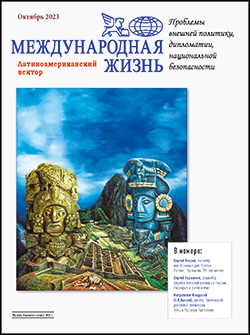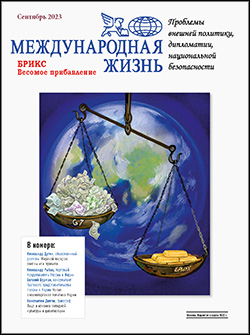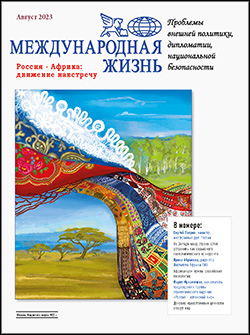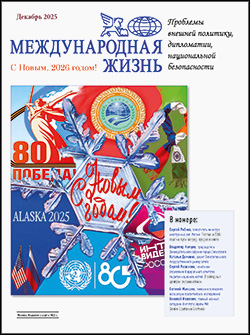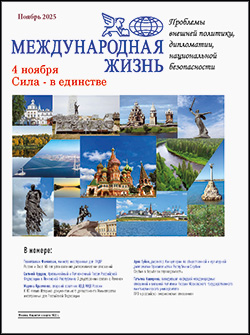Sergey Vershinin, Deputy Minister of Foreign Affairs of Russia
Priorities of the Russian Federation in the human rights field within the UN system bodies
We are building the Russian line on the UN human rights track based on positive national experience in ensuring and promoting human rights, our moral guidelines, principles and values. We are consistently and persistently working to ensure that the international community and UN human rights structures pay due attention to the protection of the rights of national, ethnic and linguistic minorities, indigenous peoples, children, disabled people, youth, the promotion of economic and social rights, issues of combating racism, racial discrimination, xenophobia, neo-Nazism, religious intolerance.
Keywords: Russia, UN, human rights protection, HRC, human rights bodies
Marcelo Ebrard Casaubon, Minister of Foreign Affairs of Mexico
130th anniversary of the establishment of diplomatic relations between Mexico and Russia
Mexico and Russia celebrate the 130th anniversary of diplomatic relations, which were officially established on December 11, 1890. This event allows us to confirm our commitment to further strengthen bilateral ties, based on the conviction that joint work will bring tangible benefits to our societies.
Keywords: bilateral contacts, cultural exchange, UNGA Resolution 74/274
Roman Marshavin, Alexey Sokolov
On the participation of international financial organizations in countering the spread of the coronavirus pandemic and assistance to affected countries
The spread of the coronavirus pandemic has led to the actual "freezing" of a number of key sectors of the world economy, breaks in global value chains, extreme volatility of commodity and financial markets, the largest outflow of capital from emerging economies in history. As a result, the world is facing the deepest recession since World War II.
Keywords: coronavirus pandemic, IMF, World Bank, recession, global economy
Egor Leonov
New trends in the development of digital diplomacy in the context of COVID-19
In 2020, the COVID-19 pandemic accelerated the process of global digitalization, including in such areas as international relations, diplomacy and world politics. There has been a forced or even forced transition of humanity to more active use of Internet platforms, social networks and other digital services.
Keywords: digital diplomacy, COVID-19, digital technologies
Yuri Zverev, Nikolai Mezhevich
Challenges to regional security: the Baltic Vector
Fundamental challenges of an economic, political and medical nature are a universally recognized fact. The discussion focuses on the second issue, namely, how these challenges affect the agenda of the world and Europe. With regard to the issues of regional security in eastern Europe, one should answer - practically nothing. In 2021, the United States and NATO will continue their military activity in Poland and the Baltic states, strengthen it and try to create the greatest possible difficulties for Russia and Belarus.
Keywords: eastern part of the Baltic Sea, Russia, USA, NATO, Poland, Baltic States, military preparations, regional security
Yuri Sayamov
Human security as a global problem
The four "horsemen of the apocalypse" that currently most threaten humanity, UN Secretary-General Antonio Guterres called geopolitical tensions, climate change, global distrust and the abuse of new technologies, saying that the world is approaching the point of no return.
Keywords: human security, COVID-19, human gap, Global Development Agenda, UNESCO, World Academy of Arts and Science, Club of Rome
The current state and prospects of the situation in Ukraine a year after the Normandy format summit in Paris
Russian and Czech experts discussed the current state of Ukraine in an online format, the conditions for ending the civil war, which continues to be a bone of contention between Russia and Europe, affects the security of the entire European region. And also to what extent does the Minsk process suit its participants?
Keywords: Ukraine, Europe, Russia, USA, "Normandy format"
Sergey Boyko
Threats to international information security in the new technological reality
Along with the undoubted benefit, the latest achievements in the field of information and communication technologies bring new challenges and threats. First of all, these are threats to international peace, security and stability. Threats to the sovereignty and territorial integrity of States.
Keywords: international information security, Internet, UN GGE, ICT
Natalia Babekina
Prospects for the development of the institute of "white hackers", or Life riding the wave
The demand for specialists in the field of information security for today and tomorrow is very high. Therefore, all kinds of advanced training courses, special trainings, interuniversity educational programs are rapidly gaining popularity. Practically no international event is complete without computer/information security competitions.
Keywords: "white hackers", ICT technologies, information security
Yuri Bulatov
The USSR and Great Britain in the Afghan direction: the disturbing everyday life of 1943
During 1943, the USSR and Great Britain managed to carry out a number of special measures in the Afghan direction, which made it possible to neutralize the activities of the Abwehr in Afghanistan.
Keywords: USSR diplomatic mission in Kabul, Ambassador K.A.Mikhailov, Third Reich, Abwehr, M.Hashim Khan, B.Ram, INRK, S.Ch.Bos, agents of the Axis Powers
Alexander Yakovenko
Civil diplomacy between Russia and the United States is in demand as never before
Against the backdrop of the coronavirus pandemic and an unprecedented election campaign in the United States, the 60th anniversary of the American-Russian Dartmouth Conference passed unnoticed. This gap is filled by the published book by the American co-chairman of the Dartmouth Conference, Philip Stewart, "How to break down barriers in US-Russian relations. The power and prospects of people's diplomacy".
Keywords: 60 years of the Dartmouth Conference, Russian-American relations, civil diplomacy
Oleg Karpovich, Lydia Kulyabina
Populism in a North American way: the view of Russian Americanists
Having barely recovered from the shock caused by the election of an undemocratic candidate as the 45th President of the United States, the Russian scientific community, among which only outspoken "optimists" from science were betting on Trump's victory, actively began to search for reasons and explanations of what happened. The collective monograph of the Institute of Scientific Information on Social Sciences of the Russian Academy of Sciences "The Trump Phenomenon" draws a peculiar line under the multidisciplinary scientific search of recent years.
Keywords: populism, Trumpism, monograph "The Trump Phenomenon"
Alexander Vorontsov
What will happen on the Korean peninsula in the next decade?
It is gratifying that a fundamental study has appeared on the Russian international political literary horizon, devoted to an attempt to theoretically comprehensively comprehend super-complex processes - the book "Modern Korea. Metamorphoses of turbulent years (2008-2020)" under the authorship of A.V. Torkunov, G.D.Toloraya, I.V.Dyachkov. And it was difficult to choose the name of the study in any other way: continuous metamorphoses, endless turbulence, and then the COVID-19 pandemic arrived.
Keywords: leading Korean scholars, North Korea, Republic of Korea, Kim Jong-un, Moon Jae-in, penjin policy, nuclear missile problem, northern territories, North-South Korean dialogue
Читайте другие материалы журнала «Международная жизнь» на нашем канале Яндекс.Дзен.
Подписывайтесь на наш Telegram – канал: https://t.me/interaffairs

 12:28 21.01.2021 •
12:28 21.01.2021 • 